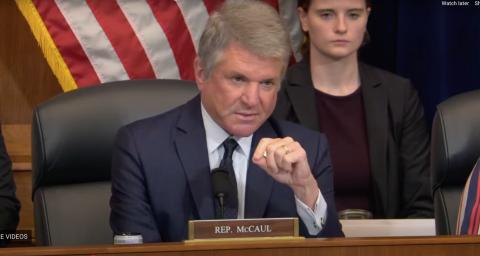McCaul Discusses Importance of USAGM's Work in Iran with Kari Lake at House Foreign Affairs Committee Hearing
WASHINGTON – Today, U.S. Congressman Michael McCaul (R-Texas) — chairman emeritus of the House Committee on Foreign Affairs — discussed the importance of the U.S. Agency for Global Media’s work in Iran with Senior Advisor for USAGM Kari Lake.

Full exchange below:
Chair Emeritus McCaul: Thank you, Mr. Chairman. Ms. Lake, thanks for being here today. I want to thank you for visiting with me in my office to talk about these challenges that you've outlined. I think the chairman has outlined them quite well. I want to commend you for reforming USAGM. I think every new administration has a right and responsibility to do so. Your testimony has highlighted systemic problems that must be addressed — more importantly, security lapses, misuse of visas, weak editorial oversight, and much more. I look forward to authorizing this agency with the chairman and his authorization bill to correct these abuses.
I remember President Reagan used Voice of America when I was entering college, as a frontline voice against Soviet oppression. It was the Voice of America, not the Voice of anti-America.
Recently, I used the Voice of America and the Open Technology Fund to translate my report on the origins of COVID-19. We disseminated it through mainland China — broke through the firewall. It went viral [and] got the attention of the CCP foreign minister, who spoke out against me and the report. That's the kind of impact this agency needs to reach.
With the events in Iran — we need America's voice in Iran right now. We need to ensure the Iranian people hear the truth: that we do not intend to harm them, but rather their oppressor and this theocratic regime of the Ayatollah. We need communications inside and outside of Iran.
This week, General Vogel, the CENTCOM commander, said the Voice of America is a critical tool for American security. You've outlined why there are many insecurities. I hope we can go back to that core mission.
So my question is, Ms. Lake, how are you working to fix the Voice of America so it is the Voice of America — and not anti-America — in Iran? And [how are you using] the Open Technology Fund to achieve the mission — the core mission that Congress intended?
Ms. Lake: Thank you for that question, and thank you for laying out when it was a better agency. You're right, Ronald Reagan used it — a great broadcaster, one of the great communicators — and he used it, but times have changed, and it's still doing 1990-style television in a world where people are getting their information right here on their smartphones. It's in the back pocket, and so we need to update it and modernize it. But President Trump's executive order dated March 14th has called for this agency to be brought to its statutory minimum.
I'm glad that you mentioned Iran, because one of the languages that is required in the statute is Farsi, and we are still broadcasting in Farsi. And Ranking Member Meeks said that we have not been, and that in a panic we started to put news out in Farsi. That is actually not true. We were in the process of effectuating President Trump's executive order, and in the process of doing that, several malicious lawsuits were started up, and the judge froze us from being able to get news on. We literally were frozen in place because of all these lawsuits.
Once we were freed to start putting news on, we immediately went to what the statutory minimum is, and one of the languages is Farsi going into Iran. I’m very proud to say that when President Trump — when the bombings happened over the weekend on Saturday and when President Trump started to speak, we had a crew in on Saturday delivering President Trump's message to the people of Iran in Farsi. It was translated and it went out. Sometimes a lean and mean and smaller staff makes it easier to get things done. In one of the emails that I got from our Persian team, they actually said that. They were able to move quicker because it was smaller, the bloat had been diminished. And I'm really proud of the fact that we got that on.
We are going to continue to operate at the statutory minimum. We are putting out content in Pashto, Dari, Mandarin, Farsi, and Spanish through the Office of Cuba Broadcasting.
Chair Emeritus McCaul: Thank you for that response. I think it's very important right now that the Iranian people hear the American story and the American message, and I commend you for your efforts to reform. I encourage you to get that message into Iran right now. Communication inside and out is so important for those people if they're going to rise up against this oppressive theocracy that we've endured since 1979. I yield back.
###